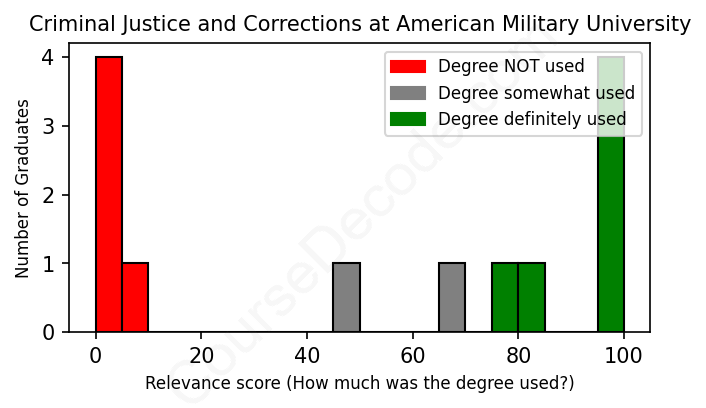
First, some facts. Of the Criminal Justice and Corrections graduates from American Military University we've analyzed , here's how many have used (or NOT used) their degree in their career:

These are estimates based on AI analysis of 13 LinkedIn profiles (see below).
The verdict? Significantly below average. Overall, with an average relevance score of 52%, Criminal Justice and Corrections graduates from American Military University have a much lower likelihood (-15%) of finding work in this field compared to the average graduate across all fields:
And for comparison, here's the chart for all profiles we've looked at across all degrees.
Also, after graduating, 53% of these graduates have pursued further education other than another Bachelor's degree (such as a Masters degree or other), compared to the average across all profiles of 35%. This suggests you may need more than just a Bachelors degree to be competitive as a Criminal Justice and Corrections graduate.
See the details:
|
Relevance score: 100% We think this person has gone into a career highly relevant to their degree. We think this person has gone into a career highly relevant to their degree.
DEGREE INFOGraduated in 2014 from American Military University with a Bachelor's degree in Criminal Justice and Corrections. Also pursued further education since (see below). JOB HISTORY SINCE GRADUATIONMarine Corps Junior Reserve Officer Training Corps (MCJROTC) Senior Military Instructor Seneca High School Sep 2018 - Present FURTHER DEGREES DONE SINCE GRADUATINGMaster's degreeWebster University 2016 - 2019 ABOUTA successful, highly organized and goal-oriented professional with over 20 years of active military service in the United States Marines Corps. Led, managed and supervised multiple departments with diverse staffs involved with administration and training, Comprehensive Inspections, Program/Project Development and Analysis, Employee Performance Appraisal and Career Progression. |
The top 10 most common jobs done by the graduates we've analyzed (ranked most common to least) are:
When looking at the job paths of alumni from the American Military University who studied Criminal Justice and Corrections, it seems like there's a mixed bag of career choices. While some folks ended up in positions that are directly related to their degree—like being a Patrol Supervisor or a Police Officer—many others found themselves in roles that don't really use what they learned. You see a lot of jobs in IT, sales, or even hotel management, where the knowledge from their criminal justice studies isn't super relevant. This shows that not everyone sticks to typical career paths within the criminal justice field, and many go for opportunities in totally different sectors.
Interestingly, while some have ventured into roles that are not directly tied to Criminal Justice, a few have found their way into jobs that truly reflect their education, such as Deputy Probation Officers or military roles that overlap with law enforcement. So, in essence, while there are some standout positions that align perfectly with the Criminal Justice and Corrections degree, a significant portion of these graduates have strayed into other fields where their education isn't put to good use. It raises an interesting point about where a degree in Criminal Justice can take you, and how transferable those skills can be—or sometimes, how they can end up gathering dust in a different career altogether.
Here is a visual representation of the most common words in job titles for Criminal Justice and Corrections graduates (this is across all Criminal Justice and Corrections graduates we've analyzed, not just those who went to American Military University):

Looking at the career paths of graduates from the Criminal Justice and Corrections program at American Military University, it's a mixed bag. Right after graduation, many of them tend to take roles that are closely aligned with their degree, like police officers or positions in corrections and military, but some have also ventured into unrelated fields like IT or sales. For example, one graduate started as an IT Helpdesk Specialist, which isn't directly related to criminal justice, while another moved into federal sales roles. The first jobs often appear to be entry-level roles in security or compliance, which makes sense given the degree focus.
Five to ten years after graduating, there’s a noticeable trend toward more advanced positions within law enforcement and corrections, with several alumni progressing to roles like deputy probation officers or even patrol supervisors. Some have established stable careers within organizations like the military or government agencies. However, others have strayed from the criminal justice field entirely, taking on non-related roles, such as management in retail or various IT positions. Overall, while many graduates find relevant positions, there’s also a fair number who end up in careers that don’t directly leverage their criminal justice education. So, it’s important for students to consider what they want to do with their degree and be open to the possibilities that come their way!
Getting a Bachelor’s degree in Criminal Justice and Corrections at American Military University, or pretty much any school, varies in difficulty depending on your interests and strengths. Generally, it’s considered to be on the easier side compared to some other majors, especially if you enjoy the subject matter since much of it is about understanding laws, systems, and human behavior. The coursework often involves reading and writing papers, but if you're good at those, you might find it manageable. There can be some tough classes, especially if they delve into more complex legal theories or specific case studies, but overall, it’s more about keeping up with assignments and engaging in discussions than about hardcore exams or intense math. If you stay organized and put in the effort, you’ll likely find it a pretty straightforward journey.
Most commonly, in the LinkedIn profiles we've looked at, it takes people 3 years to finish a Bachelor degree in Criminal Justice and Corrections.
Looking at these graduates from American Military University, it seems like a mixed bag when it comes to how much they might be making. Some of them have landed pretty solid positions, especially those who moved into tech roles or federal jobs, which usually pay well—like the grads working at Dell Technologies and various military positions. On the other hand, you also have some folks who started off in lower-paying jobs, like security and hospitality, which can drag down their overall earning potential. So, while some of them are probably doing really well financially, others might be just getting by or still working their way up. Overall, it looks like they’re on different paths with varying levels of success in terms of income.
Here is a visual representation of the most common words seen in the "about" section of LinkedIn profiles who have a Bachelor degree in Criminal Justice and Corrections (this is across all Criminal Justice and Corrections graduates we've analyzed, not just those who went to American Military University). This may or may not be useful:

Here are all colleges offering a Bachelor degree in Criminal Justice and Corrections (ordered by the average relevance score of their Criminal Justice and Corrections graduates, best to worst) where we have analyzed at least 10 of their graduates:
| College | Score | Count |
|---|---|---|
 American Military University American Military University
|
52 | 13 |
 Bridgewater State University Bridgewater State University
|
50 | 13 |
 University of Central Florida University of Central Florida
|
47 | 14 |
 University of North Texas University of North Texas
|
47 | 14 |
 University of Phoenix University of Phoenix
|
41 | 23 |
 University of Cincinnati University of Cincinnati
|
41 | 12 |
 Sam Houston State University Sam Houston State University
|
35 | 22 |
 John Jay College (CUNY) John Jay College (CUNY)
|
35 | 12 |
 Ferris State University Ferris State University
|
34 | 14 |
 Florida International University Florida International University
|
31 | 17 |
 Liberty University Liberty University
|
31 | 10 |
 California State University-Sacramento California State University-Sacramento
|
24 | 14 |
 Colorado Technical University Colorado Technical University
|
24 | 16 |